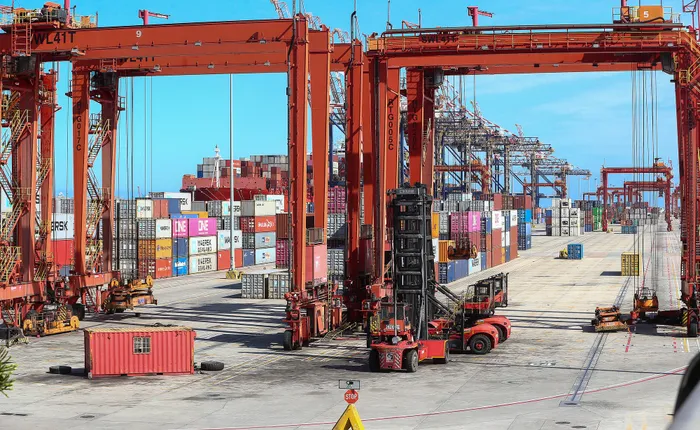South Africa’s growth to improve slightly, but job creation remains the key challenge - World Bank
ECONOMY

The World Bank report highlights that despite progress in stabilising prices, South Africa continues to face severe structural constraints, including unreliable energy supply, logistical bottlenecks at Transnet, and weak private investment.
Image: Leon Lestrade / Independent Newspapers
South Africa’s economy is projected to grow modestly in 2025, supported by easing inflation and improving investor confidence, but structural weaknesses and persistent joblessness continue to weigh on the country’s recovery.
This is according to the World Bank’s latest Africa’s Pulse report released on Tuesday, which provides economic analysis for Sub-Saharan Africa.
The World Bank said gross domestic product (GDP) growth in South Africa was projected to accelerate from 0.5% in 2024 to 0.9% in 2025 and further speed up to an annual average rate of 1.2% in 2026–27.
The biannual report forecasts regional growth to edge up to 3.8% in 2025 from 3.5% in 2024, driven by easing inflationary pressures and a gradual recovery in investment. This is better than the 3.7% forecast by the bank in its Global Economic Prospects in June.
Excluding Angola, Nigeria, and South Africa, growth in the region is expected to strengthen from 4% in 2024 to about 4.8% in 2025 and accelerate further to 5.6% per year in 2026–27.
“Over the next quarter century, Sub-Saharan Africa’s working-age population will grow by more than 600 million,” said Andrew Dabalen, World Bank chief economist for the Africa Region.
“The challenge will be matching this growing population with better jobs, given that only 24% of new workers today land wage-paying jobs. A structural shift toward more medium and large firms is essential to generate wage jobs at scale.”
However, the World Bank warned that South Africa’s growth remains too low to tackle its high unemployment and poverty levels.
The report highlights that despite progress in stabilising prices — with inflation expected to ease toward the midpoint of the SA Reserve Bank’s 3–6% target band — South Africa continues to face severe structural constraints, including unreliable energy supply, logistical bottlenecks at Transnet, and weak private investment.
“The South African economy continues to face subdued growth due to persistent structural challenges, weak productivity, and a lack of competitiveness,” the report said. “Addressing these constraints is critical to generating more and better jobs.”
The World Bank estimates that over 12 million South Africans are unemployed, mirroring the region-wide challenge of jobless growth.
The Africa’s Pulse report calls for urgent structural reforms to boost productivity and competitiveness in South Africa’s economy. These include:
Improving energy reliability by accelerating the expansion of renewable generation and strengthening Eskom’s financial sustainability.
Enhancing logistics and transport efficiency, including reforms at Transnet to reduce freight backlogs and improve port performance.
Simplifying business regulations to promote small and medium enterprise (SME) growth.
Investing in skills development and education to align training with labour market needs.
Strengthening governance and policy certainty to attract private investment.
The World Bank noted that South Africa’s efforts to open up electricity generation to private players and improve fiscal management are steps in the right direction, but warned that policy implementation remains slow.
The report emphasised that private sector expansion will be key to South Africa’s employment recovery.
Sectors such as agribusiness, tourism, construction, and renewable energy were identified as potential job creators, provided that policy reforms reduce the cost of doing business and improve access to finance.
The bank said tourism, in particular, offers a strong multiplier effect — for every job created in the sector, an additional 1.5 jobs are generated in related industries.
“South Africa’s challenge is not only to grow, but to grow differently — in ways that absorb labour and generate opportunity,” the report said.
The World Bank warned that global headwinds, including tighter financial conditions and rising debt costs, could further constrain South Africa’s fiscal space.
The country’s debt service burden has risen sharply, with interest payments consuming a growing share of public spending.
Still, the bank argued that decisive domestic reforms could unlock growth of 4% or more, creating hundreds of thousands of jobs annually and setting the country on a path toward inclusive and sustainable prosperity.
“Accelerating structural reforms to improve the business climate, including in energy and transportation, as well as enhancing the efficiency of public expenditure, remains critical for boosting economic growth,” the report said.
“South Africa’s economy has the fundamentals to grow faster. But this will require bold action to fix energy, logistics, and education — the building blocks of job-rich growth.”
BUSINESS REPORT